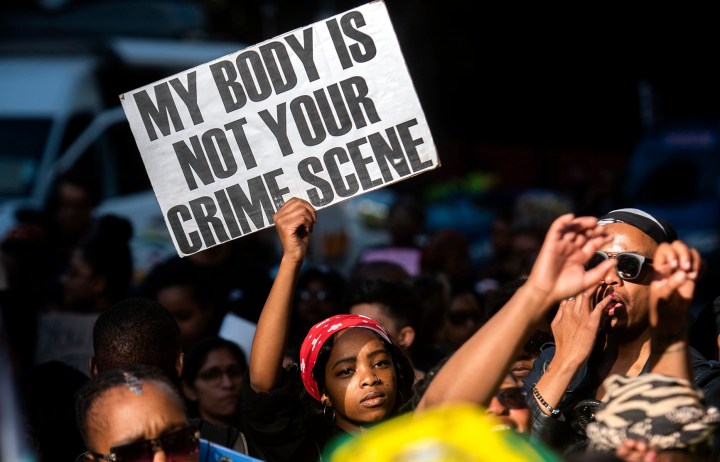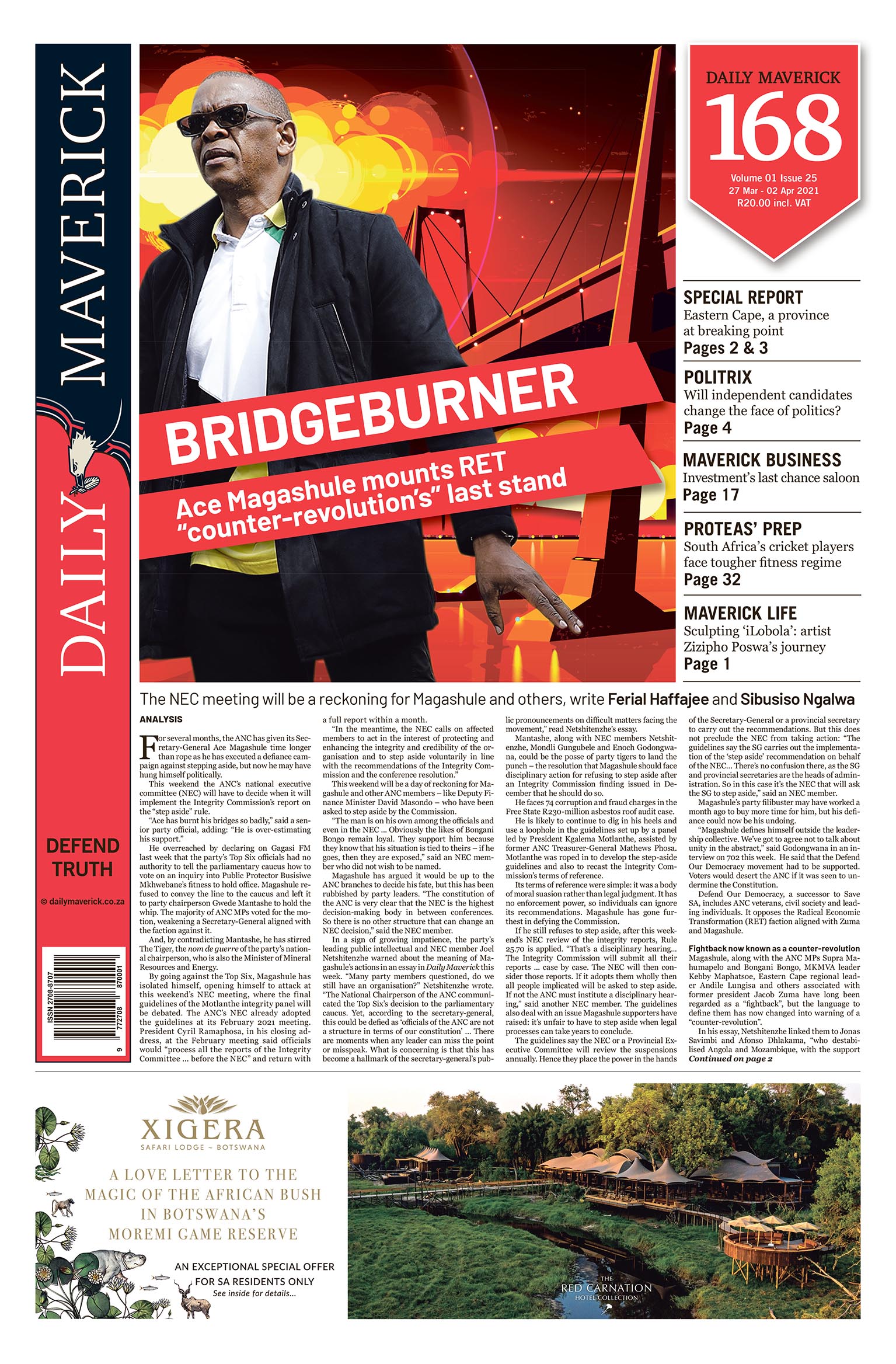MAVERICK CITIZEN 168
‘The girl who was raped’: How speaking out leads to a case of he-said-she-said and secondary trauma

There are unintended consequences to speaking out publicly about alleged sexual assault.
First published in the Daily Maverick 168 weekly newspaper.
“It’s been terrible. I’ve lost so much weight, I’ve been having panic attacks and nightmares,” said the woman who’d prefer to go by her Twitter name, Nampree. She took to social media and also laid charges of rape against DJ Fresh and Euphonik two months ago.
She said that what started out as an attempt to get justice has resulted in her being bullied, gaslit and painted as a liar by both the DJs and their fans.
The DJs, on the other hand, claimed the allegations were false, and that the serious issue of gender-based violence had been “weaponised”.
Nampree’s decision to tweet about the alleged rape – before she laid charges two months ago – comes on the back of the #MeToo movement. It got global recognition in October 2017, when US actress Alyssa Milano tweeted: “If you’ve been sexually harassed or assaulted write ‘me too’ as a reply to this tweet.” Thousands of women across the world shared their stories under the tweet.
Following #MeToo, women in South Africa took to Twitter to name and shame their alleged abusers, by direct-messaging the Twitter account @AmINext_sa, which then posted the messages on its timeline.
Since Nampree tweeted about the alleged rape in January, she’s been through an “emotional roller coaster; one minute it’s high, one minute it’s extremely low”, she told DM168.
Nampree initially tweeted about the incident that she alleged took place in 2011 and that the DJs drugged and raped her. She opened a case at the Sunnyside Police Station in Pretoria a few days later.
When the case was opened, DJ Fresh, whose real name is Thato Sikwane, and Euphonik, whose real name is Themba Nkosi, “decided to step away from all public work engagements until … this matter has been resolved and the law has taken its course”, read one of their statements.
The award-winning duo also went off air while the case was being investigated.
In early February, Primedia, which owns 947 radio station, where both DJs worked, terminated their contracts. In a statement, Primedia’s interim CEO, Geraint Crwys-Williams, said the decision “does not reflect a view on the veracity of any allegations against [the pair]. Rather it prioritises Primedia Broadcasting’s business imperatives. We believe that this decision is in the best interest of our company and our various stakeholders.”
Around the same time, the National Prosecuting Authority (NPA) said there was insufficient evidence to pursue the case.
Sanja Bornman, an attorney specialising in gender law and policy, told DM168 that for a case to proceed to court, the prosecutor must believe there is a reasonable chance of a successful prosecution. “This decision will rely heavily on all the evidence collected by the police … and what goes into the docket. A weak investigation means a weak docket, which in turn will mean that the NPA may decline to prosecute.”
Certain things may increase the chances of success, such as forensic evidence tying an accused to a rape, “but just because there may not be forensic evidence does not mean the case will automatically fail, or that it should not be prosecuted”, she said.
At the moment, prosecutors’ performance is measured, among other things, by the number of convictions they achieve. In these circumstances, it was not surprising that prosecutors did not want to take on rape cases that were not absolutely clear cut, she said. “People often think that when the NPA declines to prosecute, or even when an accused is found not guilty, this means the accused is innocent and the victim must be lying. This simply means that a prosecutor could not prove beyond a reasonable doubt, on the evidence available at the time, that the accused is guilty,” said Bornman.
Once it became clear that the case wasn’t headed to court, Sikwane and Nkosi came out guns blazing. A week after the NPA declined to prosecute, Sikwane tweeted that Nampree’s aunt, whose name he did not disclose, had called him and told him that Nampree was a “pathological liar”. Sikwane later deleted the tweet.
Nampree’s family released a statement denying Sikwane’s claims. “The family wants to make it absolutely clear that at no point did any family member call DJ Fresh to state such … This is a clear example of slander and defamation of character to damage our daughter’s reputation, character and integrity,” reads the statement.
A few weeks later, Nkosi posted what many social media users called out as a fake WhatsApp screenshot message, where he purported that Nampree had messaged him claiming that she had been pressured to fabricate her story.
“The people who made me do this are turning away from me because the lawyers want to push this further and the truth will come out but it was all a lie,” reads the screenshot that has since been deleted. Although the message in the screenshot was claimed to be fake, the cellphone number in the screenshot wasn’t. “Since then, I’ve had people calling me and harassing me,” said Nampree. Neither Sikwane nor Nkosi responded to emails and WhatsApp messages from DM168.
When the NPA declined to prosecute the case, the DJs released a joint statement saying: “As we’ve said before, these are false allegations and we are deeply saddened that gender-based violence, a serious crisis in SA, was weaponised in this manner.”
For Nampree her biggest fear about opening a case has now become reality. “I feared being called names, not being believed, being harassed and bullied.”
The backlash experienced by Nampree is not uncommon. Other women who were inspired by the #MeToo movement to speak out include singer and former ANC MP Jennifer Ferguson.
In October 2017, she posted on Facebook that SA Football Association boss Danny Jordaan had allegedly raped her 23 years earlier. She then posted on her blog: “The #MeToo disclosure of the rape I experienced a long time ago has allowed for a massive release of pain and unfinished stuff that has been growing stealthily like a tumour in these years.”
About five months later, Ferguson opened a rape case against Jordaan. Shortly afterwards, Jordaan accused Ferguson of conspiring with Irvin Khoza, chairman of Orlando Pirates, against him. Jordaan then laid defamation charges against both Khoza and Ferguson. In 2019, the NPA declined to prosecute because of insufficient evidence, Anelisa Ngcakani, the NPA’s Eastern Cape spokesperson, confirmed to DM168 this week.
In other cases, last year a woman in Bo-Kaap in Cape Town uploaded a video on Facebook accusing two elderly brothers of sexual abuse.
The men, who were well known in the community, denied the allegations. Four other women corroborated the allegations. A formal charge has not been laid. Also last year, Seyitan Babatayo tweeted that the Nigerian multiaward-winning musician D’Banj had raped her in 2018. According to reports, Babatayo had allegedly repeatedly tried to open a case against the star but was turned away by the police. Shortly after her tweet, Babatayo was arrested and later allegedly abducted by D’Banj’s manager.
Speaking about her experience of harassment, Nampree said: “There are many people looking at what’s happening to me and they’re thinking: ‘There’s no way I’m going to speak out.’”
Besides the harassment, the long-term consequences for speaking publicly about abuse range from “having an anxiety disorder and a major depressive episode to eating disorders and even, in some cases, displaying symptoms of post-traumatic stress disorder. In addition, they may experience ostracisation from their social support networks. This social rejection can further worsen the symptoms of anxiety or depression and, in some cases, even cause suicidal thoughts or suicide attempts … in an attempt to escape the pain and hopelessness of their highly stressful situation,” said Christine Laidlaw, a clinical psychologist.
The wave of support many survivors have experienced online means many often don’t consider the unintended consequences of outing alleged perpetrators online.
Taking to social media is an outlet, but it is an unfiltered, unverified platform that is open to abuse. In a 2019 interview, Emma Sadleir, a digital law expert, cautioned against what she called digital vigilantism, where abuse accusations are taken as fact before going through a legal process. “A person’s life and reputation can be ruined with one social media update. Social media shouldn’t be the first port of call,” she said.
Diana Schwarz, a social media law expert, pointed out that in terms of South African law “it is actually illegal to name and shame an alleged sexual perpetrator online”.
“Section 154 (2B) & (3) of the Criminal Procedure Act, 1977, states that no person may publish in any manner the identity of the accused in sexual offence cases before the accused has pleaded in court. This amounts to an obstruction of justice and anyone publishing such information can be charged with obstruction of justice. The identity of victims and perpetrators (especially those under the age of 18 years) are protected by the law,” she said.
The unintended consequences of naming and shaming an alleged perpetrator means that survivors and their supporters open themselves up to litigation. This could range from being sued for defamation to being charged with crimen injuria or obstruction of justice, said Schwarz.
Ntsiki Mazwai, the poet and activist, accused Sikwane in a Facebook post of being a rapist last year. Sikwane took Mazwai to court, which ruled in Sikwane’s favour.
“Alleged victims who name and shame online also experience victimisation and secondary trauma as a result of these legal consequences and the social media storms that often ensue thereafter, including cyberbullying from other users,” said Schwarz.
Like many people who have accused powerful men of rape publicly, Nampree has been accused of trying to gain clout by tarnishing Sikwane and Nkosi’s names.
“I don’t know why people think I’m looking for fame. Who wants to be remembered as the girl who was raped? There are so many other ways to get fame, but I don’t think anyone would want fame this way,” she said.
Nampree has had an amazing support system. “But I’m lucky to have the support I have; it carries me,” said Nampree. DM168
This story first appeared in our weekly Daily Maverick 168 newspaper which is available for free to Pick n Pay Smart Shoppers at these Pick n Pay stores.


















 Become an Insider
Become an Insider
Comments - Please login in order to comment.